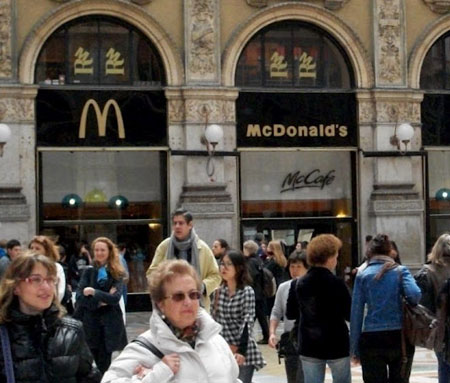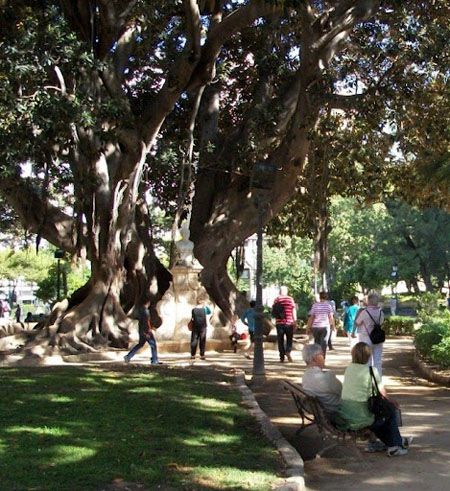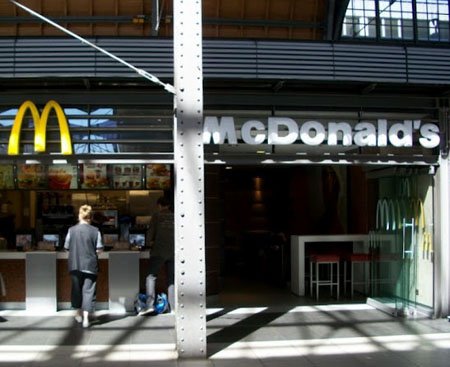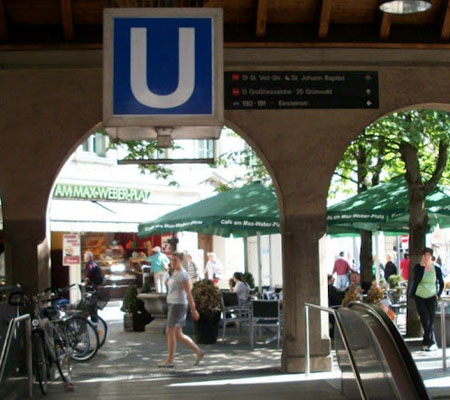Manic depressive markets … another reason for stopping the market economy from turning us into a market society?
Jun 12th, 2012 | By Randall White | Category: Key Current IssuesTwo articles I stumbled across this morning, ostensibly on the Spanish banking bailout, have brought two other articles from the somewhat more distant past into mind.
The first (in the first group) is “Europe’s Fail-Out: 4 Reasons Why Spain’s Bailout Is Doomed Already,” from the Business section of the Atlantic website. The second is “Fitch downgrades 18 Spanish banks, bond yield hits euro-era high,” from the Toronto Star.
In the Atlantic article Matthew O’Brien looks at the very rapidly fizzling bond and other market reactions to the Spanish banking bailout, initially more buoyantly viewed by both markets and the likes of the Governor of the Bank of Canada.
Mr. O’Brien asks: “Why did markets turn so quickly from gloom to doom?” And he gives his own (and many others’) “short answer: Investors are worried the Spanish bank bailout might make things worse … The devil is in the details, and the Europeans have been embarrassingly short on those.”
This may be the latest received wisdom in the international financial community, that the rest of us are supposed to accept without question. But financial markets have played a modest role in my own financial survival over the past 40-odd years. And I wonder.
Then I look up the two other articles from the somewhat more distant past, that have suddenly come back into mind. The first is an item from Business Week more than 17 years ago, on the California “value investor” Charles H. Brandes. He has very influentially (in my book at least) explained that: “The markets are very inefficient and manic-depressive. And wrong a lot.”
Brandes is far from the only observer of “manic-depressive” markets. Just over a month ago the Traders Day Trading website posted : “Elliott Wave International: The Manic-Depressive Stock Market … The Efficient Market Hypothesis (EMH) and its variants in academic financial modeling … rely at least implicitly but usually quite explicitly upon the bedrock ideas of exogenous cause and rational reaction. Stunningly … no evidence supports these premises …”
Stunningly indeed. Ie, don’t believe everything you read in the newspapers, or even in your broker’s newsletter, etc, etc. And do not base your personal strategies for mental health on anything you might observe in the behaviour of the manic-depressive markets.
Thinking only a little more deeply about these propositions raises yet another recent posting on the Atlantic website. Here the Harvard political philosopher Michael J. Sandel argues that, over the past several decades, in many parts of what used to be called the Western World, “without quite realizing it–without ever deciding to do so–we drifted from having a market economy to being a market society …”
Prof. Sandel goes on: “The difference is this: A market economy is a tool–a valuable and effective tool–for organizing productive activity. A market society is a way of life in which market values seep into every aspect of human endeavor. It’s a place where social relations are made over in the image of the market … The great missing debate in contemporary politics is about the role and reach of markets. Do we want a market economy, or a market society?”
The free and democratic society in Canada and Quebec … Rick Salutin, Michael Sandel, Frank Cunningham, and Karl Polanyi
I do not have any trouble answering this question myself. In my country (Canada), the Constitution Act 1982Â clearly (albeit somewhat indirectly: it is Canada after all) prescribes “a free and democratic society.”
I do think that, as Prof. Sandel suggests, a “market economy is …Â a valuable and effective tool … for organizing productive activity” in a free and democratic society. Yet as far as I’m concerned a free and democratic society writ large is certainly not “a place where social relations are made over in the image of the market.”
One reason we do not want to inadvertently fall into a market society, eg, is that the markets we have in the market economy are already so manic-depressive. To ask the same frantic nervous energy that guides the manic-depressive markets to guide all our society would invite even more social confusion and instability than we already have.
This brings to mind another recent Canadian newspaper article, from the Toronto Star – “Canadians owe a debt to Quebec’s student strikers,” by Rick Salutin.
Here I should preface my ultimate thoughts by acknowledging that some of my best friends – in the rest of Canada where I live, outside Quebec – feel that the Quebec students, who are protesting quite modest hikes in the lowest university tuition fees in Canada (where university tuition is already considerably lower than in the neighbouring USA), are altogether beyond belief.
I have a hard time myself, reconciling the extent and passion of the Quebec student protests with a prospective few hundred dollar increase in the lowest university tuition fees in the country. I have read about how Quebec is more plugged into Western Europe, where the comparative picture is different. And there does seem some degree in which the Quebec student protests have sometimes been hijacked by other demonstrators with broader agendas. But these explanations still don’t cover the waterfront for me.
If what Rick Salutin says the Quebec students are up to is even half true, on the other hand, they are making more sense. As he puts it: “We owe them for taking a shot at saving our national honour in the eyes of the world. We’ve lost brownie points on the environment, our even-handedness in areas like the Mideast, our commitment to peacekeeping – but their campaign for equal, publicly funded access to higher education hits a note closer to that other, previous Canada. I should add I don’t begrudge the Harper government its shifts; it’s what they said they’d do. But they don’t reflect the attitudes still held by more than 60 per cent of the population – at least according to how they vote … We owe them [the Quebec students] for striking a blow on behalf of public discourse. I’m thinking here of the term entitlements, which has replaced rights in the discussion. When did health, housing, a dignified retirement, etc., stop being human rights and turn into shabby, whiny entitlements? It didn’t just happen. There’s a linguistic war on, and it isn’t French versus English; it’s over politically loaded terms.”
These are also examples of what it means, it seems to me, to talk about not letting the valuable market economy push us all the way into a much less valuable market society. And here again Prof. Sandel is not the only who one has been trying to ring these bells in the more recent past. Consider, eg, these comments from one Frank Cunningham, some seven years ago, in an article on “Market Economies and Market Societies … This topic is often framed in language first employed by Karl Polanyi. He described a progression in the development of market mechanisms from the Industrial Revolution: ‘This institutional gadget, which became the dominant force in the economy–now justly described as a market economy–then gave rise to yet another, even more extreme development, namely as a whole society embedded in the mechanism of its own economy–a market society.’1 … The question is whether market economies must engender market societies … Evidence that welfarist and social-democratic constraint on capitalism is possible is that it has been approximated in various times and places, for instance, Northern Europe, Canada, and Japan … [1 Karl Polanyi, The Livelihood of Man (New York: Academic Press, 1977, posthumously published from essays written between 1954 and 1964), 9.]
Coda : What’s really going on in Europe, and do we in North America really care?
In at least some respects I think Michael Sandel is at least half-wrong when he says that : “The great missing debate in contemporary politics is about the role and reach of markets. Do we want a market economy, or a market society?”
In effect, if not as a matter of open rhetoric, this is, arguably enlough, exactly the fundamental issue in the 2012 US presidential election. It is the fundamental issue that pits the current Harper government in Canada against its opponents.
It is the issue that elected Francois Hollande president of France, and the issue that is causing Angela Merkel so much fresh trouble in Germany. (Though as a far from rabid right-wing German citizen recently explained, in response to my question about just how good or bad Ms. Merkel is, “who else is there?”)
Prof. Mandel, on the other hand, is certainly right, in the very important sense that the debate over this fundamental issue is still being conducted in some strange code, that obscures so much that is important – and even tries to blur the distinction between market economy and market society. And here, just to round things out for now, are eight (more or less) recent cases in point:
(1) The Austerity Agenda … By PAUL KRUGMAN …Â So what happens if everyone simultaneously slashes spending in an attempt to pay down debt? The answer is that everyone’s income falls – my income falls because you’re spending less, and your income falls because I’m spending less. And, as our incomes plunge, our debt problem gets worse, not better … This isn’t a new insight. The great American economist Irving Fisher explained it all the way back in 1933, summarizing what he called “debt deflation” with the pithy slogan “the more the debtors pay, the more they owe.” Recent events, above all the austerity death spiral in Europe, have dramatically illustrated the truth of Fisher’s insight … As I said, this isn’t a new insight. So why have so many politicians insisted on pursuing austerity in slump? And why won’t they change course even as experience confirms the lessons of theory and history? … Well, that’s where it gets interesting. For when you push “austerians” on the badness of their metaphor, they almost always retreat to assertions along the lines of: “But it’s essential that we shrink the size of the state.”
(2)Â A look at the 4 eurozone countries with bailouts aimed at preventing them from collapsing … While the figure Spain is allotted seems large, it pales in comparison to the size of Spain’s economy – which is bigger than those of Greece, Ireland and Portugal combined and is the eurozone’s fourth largest. The loans are also destined only for the banks – not to prop up the country’s own finances, as the previous bailouts were for the other nations.
(3) Peter Popham: Amid the bailouts, a United States of Europe takes shape … Never mind details of rescue funds, Eurobonds and the like, moves towards a federated Continent are now unstoppable, says veteran Independent on Sunday correspondent.
(4)Â JOHN IBBITSON … Harper prepares Canadians for possibility of another recession … Stephen Harper’s warnings that Europe needs to get its house in order, and not look to Canada for help, was mostly intended for folks back home … The Prime Minister is preparing Canadians for the possibility of another recession, while insisting that it’s the Europeans, not his government, who will be to blame.
(5) The Euro Crisis … After Spain, Is Italy the Next Domino to Fall? [Why are practitioners of the manic-depressive public policy arts so addicted to domino metaphors? There are virtually no examples in the real history of the world of neurotically linked domino cascades!]
(6) ROBERT KUTTNER … Which Road for Europe? … Hollande’s working legislative majority, Rajoy’s display of nerve, the criticism by ECB President Mario Draghi of the politicians’ dithering, and Merkel’s increasing isolation among European leaders should increase the chances that the austerity mongers may yet relent. But Merkel, thus far, shows no sign of moderating her stance … .
(7) The close: Dow, TSX cruise higher despite euro zone tremors.
(8) Kirk Douglas … We Are Spartacus … After 95 years on this planet, I have come to the conclusion that the human spirit can never be crushed, no matter how cruel the oppressor or fanatic the belief. If we remember that simple truth – and act on it every day in small ways and sometimes in large movements – then freedom will ultimately win … And then we are all Spartacus.










